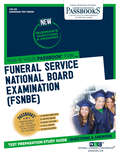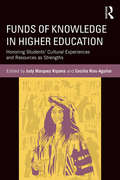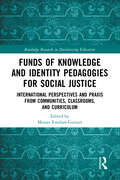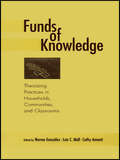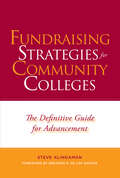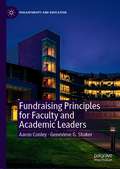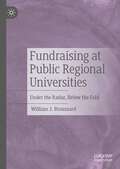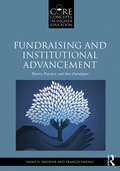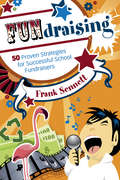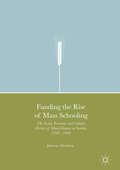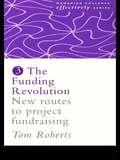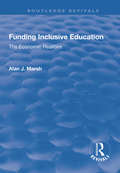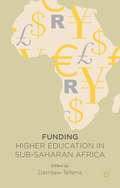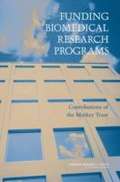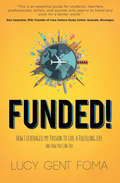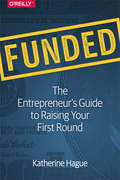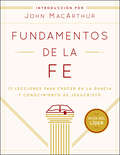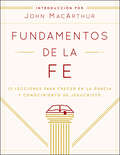- Table View
- List View
FUNERAL SERVICE NATIONAL BOARD EXAMINATION: Passbooks Study Guide (Admission Test Series)
by National Learning CorporationThe Admission Test Series prepares students for entrance examinations into college, graduate and professional school as well as candidates for professional certification and licensure. The Funeral Service National Board Examination (FSNBE) Passbook® prepares you by sharpening the skills and abilities necessary to succeed on your upcoming entrance exam. It provides a series of informational texts as well as hundreds of questions and answers in the areas that will likely be covered on your upcoming exam, including but not limited to: history and sociology; funeral directing; funeral law; embalming; human anatomy; and more.
Funds of Knowledge in Higher Education: Honoring Students’ Cultural Experiences and Resources as Strengths
by Judy Marquez Kiyama Cecilia Rios-AguilarRefining and building on the concept in a sophisticated and multidisciplinary way, this book uses a funds of knowledge approach and connects it to other key conceptual frameworks in education to examine issues related to the access and transition to college, college persistence and success, and pedagogies in higher education. Research on funds of knowledge has become a standard reference to signal a sociocultural orientation in education that seeks to build strategically on the experiences, resources, and knowledge of families and children, especially those from low-income communities of color. Challenging existing deficit thinking in the field, the contribution of this unique and timely book is to apply this concept to and map future work on funds of knowledge in higher education.
Funds of Knowledge and Identity Pedagogies for Social Justice: International Perspectives and Praxis from Communities, Classrooms, and Curriculum (Routledge Research in Decolonizing Education)
by Moises Esteban-GuitartThis edited volume takes the US-derived concept and praxis of funds of knowledge and applies it globally to critically analyse current education in line with social justice, antiracism, and culturally sustaining pedagogies. Edited by one of the premier international voices for the funds of knowledge approach, and in particular funds of identity theory, chapters foreground first-hand, participatory, research-practice experiences with learners, schools, and local communities. These experiences demonstrate the positive, social-justice inspired pedagogical actions that result in, and reveal, powerful possibilities for a decolonialised, antiracist praxis that aims to eradicate deficit thinking in education. Further, the inclusion of voices that are typically "othered" in the construction and distribution of academic knowledge make this a seminal volume in the field. Ultimately, the volume will be of interest to scholars, students, and researchers working in the sociology of education, psychology of education, and those specifically dealing with antiracism, decolonialism, and equity within education.
Funds of Knowledge: Theorizing Practices in Households, Communities, and Classrooms
by Luis C. Moll Norma González Cathy AmantiThe concept of "funds of knowledge" is based on a simple premise: people are competent and have knowledge, and their life experiences have given them that knowledge. The claim in this book is that first-hand research experiences with families allow one to document this competence and knowledge, and that such engagement provides many possibilities for positive pedagogical actions. Drawing from both Vygotskian and neo-sociocultural perspectives in designing a methodology that views the everyday practices of language and action as constructing knowledge, the funds of knowledge approach facilitates a systematic and powerful way to represent communities in terms of the resources they possess and how to harness them for classroom teaching. This book accomplishes three objectives: It gives readers the basic methodology and techniques followed in the contributors' funds of knowledge research; it extends the boundaries of what these researchers have done; and it explores the applications to classroom practice that can result from teachers knowing the communities in which they work. In a time when national educational discourses focus on system reform and wholesale replicability across school sites, this book offers a counter-perspective stating that instruction must be linked to students' lives, and that details of effective pedagogy should be linked to local histories and community contexts. This approach should not be confused with parent participation programs, although that is often a fortuitous consequence of the work described. It is also not an attempt to teach parents "how to do school" although that could certainly be an outcome if the parents so desired. Instead, the funds of knowledge approach attempts to accomplish something that may be even more challenging: to alter the perceptions of working-class or poor communities by viewing their households primarily in terms of their strengths and resources, their defining pedagogical characteristics. Funds of Knowledge: Theorizing Practices in Households, Communities, and Classrooms is a critically important volume for all teachers and teachers-to-be, and for researchers and graduate students of language, culture, and education.
Funds of Identity: Social, Cognitive and Computational Perspectives)
by Moisès Esteban-GuitartDrawing on research conducted mostly in Catalonia (Spain), Moisès Esteban-Guitart outlines a distinct vision of education enhanced by students' identities, which leads to a discussion of the sociocultural factors that shape the processes of learning. He brings these ideas to life by examining traits of a mobile-centric society, the present-day ecology of learning, and his three metaphors of learning (connecting knowledge, connecting minds, and connecting communities). He then suggests a number of basic principles regarding learning for the twenty-first century based on prior literature in the learning sciences. He presents the terms 'funds of identity' and 'meaningful learning experiences', and reviews the funds of knowledge approach and the Vygotskian basis for understanding identity. In the second part of the book, he illustrates a number of strategies for detecting students' funds of identity and their meaningful learning experiences, and describes some practical experiences based on the theoretical framework he adopted. Revises theoretical principles for education in the twenty-first century. Develops and illustrates how to use students' identity pedagogically. Addresses the situated and distributed nature of learning.
Fundraising Strategies for Community Colleges: The Definitive Guide for Advancement
by Steve KlingamanThis book is a co-publication with CASE.Fundraising Strategies for Community Colleges is a hands-on, step-by-step guide to building a million-dollar-a-year development office.Community colleges educate nearly half the undergraduates in America yet receive as little as two percent of all gifts to higher education. Private philanthropy is now essential to the mission of community colleges. In order to gain a fair share, community colleges can rely on this book to deploy strategies effectively used by 4-year colleges. The author, Steve Klingaman, has raised over $40 million dollars for two-year and four-year colleges over a 25-year development career.With its emphasis on planning the work and working the plan, Fundraising Strategies for Community Colleges offers practical advice and concrete steps on how to build a strong advancement team with robust Annual Fund, grants, major gifts, planned giving programs.Topics include:* Strategies used at one two-year college that raised $50 million over ten years* 75 boxed tips on the details that matter most* How to create an institutional commitment to advancement* How to enhance the advancement function* How to build an effective foundation board that gives* How to grow the Annual Fund with sustainable, repeatable gifts* Secrets top universities use to close major gifts* Continuous quality improvement techniques to improve results year after year.Fundraising Strategies for Community Colleges is the only comprehensive development guide to focus on community college fund raising. Written for development professionals, college presidents, board members, trustees, faculty leaders, and other college leadership, this book is an essential, practical guide that fills a critical gap in the market.
Fundraising Principles for Faculty and Academic Leaders (Philanthropy and Education)
by Aaron Conley Genevieve G. ShakerThis book includes evidence-based insights and recommendations to help academicians excel in raising philanthropic support for their institutions and units. The book provides historical and contemporary perspectives on core concepts and data, research revealing donors’ giving motivations, engagement strategies and tactics for academic units, and guidance on management challenges including strategic plans, campaigns, and measuring performance. The authors include case studies in each section as examples of successful fundraising and volunteer-driven initiatives. The final section, contributed by Dean David D. Perlmutter, reinforces the book’s many practical and theoretical approaches to the fundamental responsibilities academic leaders face in raising philanthropic support. This book is grounded in the growing academic literature on philanthropy and written by scholars who were successful higher education fundraisers.
Fundraising at Public Regional Universities: Under the Radar, Below the Fold
by William BroussardThis book examines fundraising engagement and the university advancement and development professionals who make it happen at public regional universities in the United States. These institutions are disproportionately under-resourced by state and federal subsidies, and private fundraising has become increasingly relied upon by students attending these institutions while the actual fundraising departments remain understaffed, overworked, and struggling to capture the imaginations of private donors and corporate and family foundations. The book focuses on how advancement professionals at these institutions across the nation have overcome the aforementioned challenges to attain support for their universities unchanging missions in these ever-changing times—to educate a critical mass of United States’ future citizens, workforce, and leaders while providing a socioeconomic ladder to its most vulnerable students.
Fundraising and Institutional Advancement: Theory, Practice, and New Paradigms (Core Concepts in Higher Education)
by Noah D. Drezner Frances HuehlsIn this timely textbook, authors Drezner and Huehls take the interdisciplinary, complex nature of the study of philanthropy and fundraising and apply it to the field of higher education. Covering issues of increasing importance to institutions—including donor cultivation, growth of fundraising at community colleges and minority institutions, engagement of young alumni, volunteerism, and the competing roles of stakeholders—this book helps readers apply theory to the practice of advancement in post-secondary education. Special Features: Coverage of historical and theoretical underpinnings and insights from related literature and research. Discussion of new donor populations including women, communities of color, the LGBTQ population, students, and young alumni. On-the-ground case studies bring theories into focus by creating a bridge to experience and action. Practical implications for the design of fundraising campaigns and strategies. Guiding questions that encourage students to think beyond the current literature and practice. This textbook bridges research, theory, and practice to help higher education administrators and institutions effectively negotiate the fundraising terrain and advance their institution.
FUNdraising: 50 Proven Strategies for Successful School Fundraisers
by Frank SennettPresents 50 fun, creative, and cost-effective fundraising strategies from schools across the country and includes savvy organizing tips, guidance on ethical issues, and advice for avoiding mishaps.
Funding your Career in Science
by Ritsert C. JansenDreaming of a successful future in science? This practical guide for students, postdocs and professors offers a unique step-by-step approach to help you get the funding to start or consolidate your own research career. From preparing and writing effective career grant applications, to understanding how funding agencies will evaluate them, it provides guidance to enhance your skills and combine them with those of others who can support you on the road to success. Learn how to generate great original ideas for your application, strategically prepare and optimise your plan and rsum, develop a convincing title and abstract, convert reviewers' comments to your advantage, and succeed at a selection interview. With numerous valuable tips, real-life stories and novel practical exercises, this must-read guide provides everything you need to optimise your funding opportunities and take responsibility for your own career in science.
Funding the Rise of Mass Schooling
by Johannes WestbergThis book presents expert analysis on how the remarkable rise of mass schooling was funded during the nineteenth century. Based on rich source materials from rural Swedish school districts, and drawing up evidence from schooling in countries including France, Germany, England and the U. S. , Westberg examines the moral considerations that guided economic practices and sheds new light on how the advent of schooling did not only rest upon monies, but also on grains, firewood and cow fodder. Exploring school districts' motives and economic culture, this book shows how schooling was neither primarily guided by frugal impulses nor motivated by a fear of the growing working classes. Instead, school spending served multiple purposes in school districts that pursued a fair and reasonable economic practice. In addition to being a highly-detailed case study of Sweden 1840 - 1900 this book also entails a broadening of the theoretical horizon of history of education into social, agrarian and economic history in a wider context. With a focus on different systems of school finance, this work reveals a key change over time: from a largely in-kind system supporting schools in an early phase, followed by an increasingly monetarized, depersonalized and homogenized system of school finance. Boasting an interdisciplinary appeal, this will be a welcome contribution of interest to scholars in the fields of education history, sociology, and economics.
The Funding Revolution: New Routes to Project Fundraising
by Tom Roberts Mr Tom Roberts*****Nfa*****At a time when traditional funding is diminishing and costs increasing, the need to look to new external sources of money is now central to survival for many organizations. New avenues of funding often demand a new outlook, and old ways of thinking can prove to be barriers to success. This book looks not only at methods for raising funds, providing practical steps in preparing for new funding initiatives, but also at the attitudes and mind-sets that form part of the whole picture. The volume is concise and accessible, with plans of action, bullet lists and diagrams for ease of consultation.
Funding Inclusive Education: The Economic Realities (Monitoring Change In Education Ser.)
by Alan J. MarshThis title was first published in 2003.Funding for pupils with special educational needs has created resource management difficulties for schools and budgetary control problems for LEAs. Special educational needs is a frequent area of LEA overspending. These issues are particularly important as the development of inclusion and raising attainment for all pupils are key Government priorities. Many LEAs are now considering revisions of their funding formulae for additional and special educational needs during Best Value Reviews and Fair Funding consultations. This stimulating and accessible book examines the policy context for formula funding and the design and accountability issues for the construction of a revised formula. One of the central themes is the idea that a funding formula should be viewed as a key instrument of policy to assist in delivering specific inclusive policy objectives to meet the additional and special educational needs of pupils.
Funding Higher Education In Sub-saharan Africa
by Damtew TeferraVirtually all countries in the world are struggling to provide the necessary resources to Higher Education. The challenges are particularly complex for economically poor countries in Africa, which have recorded massive expansion in the past decade. This book analyzes the state of funding and financing higher education in Sub-Saharan Africa.
Funding Biomedical Research Programs: Contributions of the Markey Trust (2006)
by National Research Council of the National AcademiesDuring an interval of 15 years, the Lucille P. Markey Charitable Trust spent over $500 million on four programs in the basic biomedical sciences that support the education and research of graduate students, postdoctoral fellows, junior faculty, and senior researchers. The Markey Trust asked the NRC to evaluate these programs with two questions in mind: “Were these funds well spent?” and “What can others in the biomedical and philanthropic communities learn from the programs of the Markey Trust, both as an approach to funding biomedical research and as a model of philanthropy?” One of five resulting reports, this volume examines the Research Program Grants, which awarded $323 million to support investigators with a major commitment to the life sciences and to assist in the establishment, reorganization, or expansion of significant biomedical research centers or programs. Using information from Markey archives, materials from grant recipients, and site visits to a sample of institutional grant recipients, the authoring committee describes the impact that Markey grants made on the centers and programs funded by these grants, along with the unique aspects of the Markey approach to funding that may be applicable to other funders of biomedical research programs.
Funded!: How I Leveraged My Passion to Live A Fulfilling Life and How You Can Too
by Lucy Gent FomaYou don’t have to be an extraordinary student to get fellowships and pursue your passions. All it takes is strategic planning and a fellowship-writing skillset. Funded! tells the story of how an average student went on to win a Fulbright among other scholarships, fellowships, and grants to travel the world and pay for her Ivy League education. It includes breakout boxes with anecdotes from past fellows’ experiences, stories from the field, and advice from mentors. Exercise sheets are sprinkled throughout the text for you to practice and note your ideas as you go. As a step-by-step guide taking you from the phase of dreaming about your project all the way to finding the right fellowship and preparing your application, Funded! makes the process manageable by breaking it into steps that anyone can follow. If you are looking for an inspiring career or want to activate a dormant passion in your work, Funded! will teach you the foundational skills to become the change agent you want to be. It is geared toward individuals who are starting their careers and those who have a vision of setting out to do their own thing. Do you want to take time off from your regular job or even switch your career? Adding a grant, scholarship, or fellowship to your resume can only help your future. Funded! tells you how to become the competitive applicant that these scholarship committees look for, including tips from actual Fulbright reviewers. Funded! has the feeling of a popular novel, the type of book you’d read on a sunny Sunday as a treat for completing all your chores; yet it is a powerful tool that will leave you with a product to be proud of and a cache of motivation to carry you through to winning the fellowship of your dreams.
Funded: The Entrepreneur's Guide to Raising Your First Round
by Katherine HagueThe venture capital world is often intimidating and hard to navigate, even for the most seasoned entrepreneurs. But it doesn't have to be. Entrepreneurs who run effective fundraising processes don't do it by accident. With this book, you'll learn what it takes to successfully raise a round of funding for your company.Author Katherine Hague explains how the venture capital industry works, and walks you through each step necessary to plan, execute, and optimize your own fundraising round. Packed full of exercises, checklists, and templates, this book guides you through the process from start to finish. It's ideal for entrepreneurs raising later rounds of capital, as well as those just starting out.Gain an understanding of core venture capital concepts and standardsLearn how to develop and hone an investor pitchCome away with a plan to hit the fundraising trail for your companyDevelop the confidence you need to negotiate key terms in a funding dealUnderstand best practices in fundraising, and learn how to avoid the top 10 fundraising mistakes
Fundations Student Composition Book 3
by Barbara WilsonEach student has a Composition Book for dictation of sounds, words, and sentences. It provides the writing guides and structure to assist students with letter formation. This book can be purchased separately or in a 10-pack. It is also a component of the Student Consumable Pack 3, Student Kit 3, and Teacher's Kit 3.
Fundamentos de la Fe (Guía del Líder): 13 Lecciones para Crecer en la Gracia y Conocimiento de Jesucristo
by Grace Community ChurchEsta es la guía del maestro para este gran estudio de las creencias Fundamentales de la Fe. Incluyendo temas como "Dios: Su Carácter y Atributos" y "La Iglesia: Comunión y Adoración" este estudio es ideal para discipular a nuevos creyentes o refrescar una vez más lo que significa creer en Jesús. La Guía del Maestro contiene todas las respuestas a las 13 lecciones impartidas en la Edición del Estudiante junto con excelente notas de enseñanza para preparar al líder para guiar al grupo.-------------------------------------------------------------------------Teacher's guide to the popular study Fundamentals of the FaithWith topics ranging from &“God: His Character and Attributes&” to &“The Church: Fellowship and Worship,&” this course on the basics of the Christian faith is ideal for discipling new believers or realizing afresh what it means to follow Jesus. The material is trusted, but a good teacher is critical. This guide will help you be that teacher, containing answers to the 13 lessons as well as excellent teaching notes to prepare you to guide the group. Corresponds to the 13-lesson workbook students will be using.
Fundamentos de la Fe (Guía del Líder): 13 Lecciones para Crecer en la Gracia y Conocimiento de Jesucristo
by Grace Community ChurchEsta es la guía del maestro para este gran estudio de las creencias Fundamentales de la Fe. Incluyendo temas como "Dios: Su Carácter y Atributos" y "La Iglesia: Comunión y Adoración" este estudio es ideal para discipular a nuevos creyentes o refrescar una vez más lo que significa creer en Jesús. La Guía del Maestro contiene todas las respuestas a las 13 lecciones impartidas en la Edición del Estudiante junto con excelente notas de enseñanza para preparar al líder para guiar al grupo.-------------------------------------------------------------------------Teacher's guide to the popular study Fundamentals of the FaithWith topics ranging from &“God: His Character and Attributes&” to &“The Church: Fellowship and Worship,&” this course on the basics of the Christian faith is ideal for discipling new believers or realizing afresh what it means to follow Jesus. The material is trusted, but a good teacher is critical. This guide will help you be that teacher, containing answers to the 13 lessons as well as excellent teaching notes to prepare you to guide the group. Corresponds to the 13-lesson workbook students will be using.
Fundamentos de la Fe (Edición Estudiantil): 13 Lecciones para Crecer en la Gracia y Conocimiento de Jesucristo
by Grace Community ChurchLos domingos por la mañana en la Iglesia Grace Community, pequeños grupos de personas se reúnen para las clases de Fundamentos de la Fe y usan este manual de trece lecciones que combina verdades y bases bíblicas con el servicio y obediencia personal. Muchos nuevos creyentes han tomado estas clases para crecer en su entendimiento de las verdades bíblicas. Por primera vez, Fundamentos de la Fe esta disponible a la venta. Incluyendo temas como &“"Dios: Su Carácter y Atributos" y "La Iglesia: Comunión y Adoración" este estudio es ideal para discipular a nuevos creyentes o recordar una vez más lo que significa creer en Jesús.Cada lección está saturada de herramientas de aprendizaje para ayudarle a participar de las Escrituras como: un enlace a 13 mensajes de John MacArthur que puede descargar, preguntas de estudio, versículos para memorizar y sugerencias prácticas para la aplicación. ----------------------------------------------------------------------On Sunday mornings at Grace Community Church, where John MacArthur preaches, small groups gather together in Fundamentals of the Faith classes to use this manual of thirteen lessons that blend basic biblical truths with personal obedience and service. For the first time ever, Fundamentals of the Faith is available to everyone in book form. With topics ranging from &“God: His Character and Attributes&” to &“The Church: Fellowship and Worship,&” this study is ideal for discipling new believers or realizing afresh what it means to follow Jesus. Each lesson is loaded with learning tools to help you engage Scripture: A link to 13 free downloadable messages by John MacArthur himselfStudy questions and memory versesSuggestions for practical applicationIf you are a new believer or know someone who is, Fundamentals of the Faith is the perfect resource for establishing a solid biblical foundation for the Christian life.
